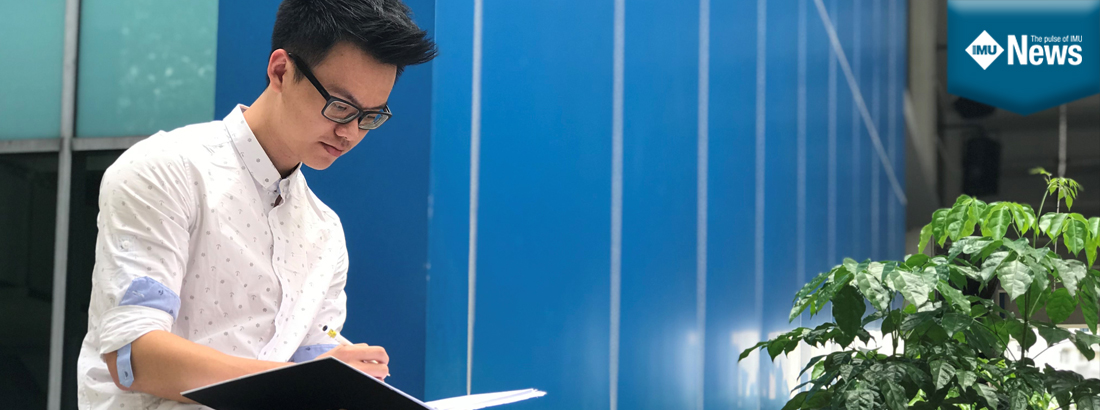Goh Kee Woon wanted to gain weight. In order for him to do so, Kee Woon started doing exercises in the gym, particularly weight resistance training and started to search through the internet for information without knowing that it could be false information. From there, he learnt that he is more interested in finding out how food and nutrients work in a human body. However, this was not Kee Woon’s first choice of career. He started studying architecture but through the years of studying this, he felt that he had no direction at all. Consistently questioning himself, not doing well in architecture and thinking about meaning of life had put him at a crossroad.  “Giving up isn’t my first choice in fact, I really wanted to finish the degree course. I did the math and learned that I will waste even more time if I stay and finish the architecture course and take other random courses related to nutrition after. I have wasted enough time and money, why waste even more time in doing things that is meaningless and useless to me? So I look for ways to enter a degree in nutrition and eventually ended up being a nutrition student at IMU.”
“Giving up isn’t my first choice in fact, I really wanted to finish the degree course. I did the math and learned that I will waste even more time if I stay and finish the architecture course and take other random courses related to nutrition after. I have wasted enough time and money, why waste even more time in doing things that is meaningless and useless to me? So I look for ways to enter a degree in nutrition and eventually ended up being a nutrition student at IMU.”
“I started to check with universities that offers a degree programme in nutrition. There were a few options and I filtered the options by looking at the course structure and modules. Among the few options, IMU caught my attention because I saw modules like ‘Human Physiology’, ‘Sports and Exercise Science’, ‘Nutrition in Sports’, and some other modules that I’m interested in learning.”
Commenting on his time at IMU, Kee Woon said, “I enjoy learning things I never knew about nutrition. However, what I enjoyed the most isn’t the studying part. It is talking to the lecturers. I am glad that the lecturers are kind enough to share things they have experienced in this field and through their sharing, I learned a lot. I am a huge believer of human interaction and so I enjoy talking to people rather than staring at theories.”
“Through past one and a half years of studying nutrition, I have done some community projects, field trips, and hands on assignments. The challenges my course mates and I experienced through these assignments are packed with learning experience. They get us closer to the actual issues that are happening in the community. Field trip is a great example, we had the opportunity to visit health clinics and interact with practicing nutritionists and dietitians and these experiences allows us to realise what we can provide with our profession. I am not sure whether my fellow coursemates feel the same but this is what I think.”
“Most of my course mates are 3 to 4 years younger. Without a single doubt, there are some gaps in terms of thoughts, opinion, and communication. However, I believe that this is not a good reason for me to isolate myself from them and there’s no need to hide or act ‘younger’ to blend in. Be natural and be who you are just as how I would tell my course mates to be brave enough to be themselves. It is what makes us different from any of the other nutrition students and nutritionists.” 
Kee Woon has this to say about the differences in studying architecture and nutrition. “The design school is a very casual place. Communication between students and lecturers/architects are casual, with respect of course. We spent most of our time in the studio, a room with huge space where everyone will be there to do their work, rest, sleep, talk, etc. It feels like we live there and I actually called it my first home. In architecture, we spend a lot of time in developing ideas, matching it with reality and regulations, connection of spaces, and producing drawings. Each of these takes hours which is why design students don’t get enough sleep.”
“When I first entered the science programme, I was so surprised. Everyone seemed strict and formal. I was late for 3 minutes and it felt as if I was late for an hour. The way people communicate is relatively more formal too. Over time, I adapted to the culture here and I understood why things are done this way as compared to the design school. It is the professionalism that we practice here in the science field.” “The biggest difference between studying nutrition and architecture is, nutrition has solid science based evidence to back up the theories and intervention while there is almost no rules to the composition of spaces and design concepts because it is very subjective. However there are still building law and regulations to follow and the biggest pain I experienced was to match my design concept with the building law and regulations and things got messy because they all don’t match.”
| Advice to someone who is at the crossroad of their life |
|---|
| No matter what age and what stage of life you are, as long as you’re not dead yet, you still have time. Use the time that you have to think and restructure your thoughts into actions that is best cater to the situation that you’re in. I always wanted to say this in public but I kept forgetting. Based on my situation, I talked to my parents about it and I am very lucky that my parents are still capable of supporting my ‘second chance’ of education. I am not trying to say that I have the greatest parents on Earth. What I’m trying to say is, do not be afraid of sharing it with people around your especially those who are involved and those who are close to you. Seek for opinions from different people with a open heart and mind and make decisions with independent thinking. Instead of spending time ranting and blaming at things, use the time that you have to sort things out and start taking action. |
| What would you advice someone who wants to study nutrition? |
|---|
| I believe most people are still clueless about nutrition when choosing their tertiary studies. I will leave the explanation of what nutrition is to the advisors and lecturers. A person can have ten thousand excuses to escape but only one reason to get started. That one reason can come from interests, goals, dream, and more. Tertiary studies can be our stepping stone to our future career. It is the first time of our life that we get to make decision that is going to affect our remaining life. If it does not sound convincing enough, it is going to at least affect our next 3 to 4 years. I had my worst nightmare spending only 2 years in architecture and I changed to nutrition because I have goals and life purpose to fulfill, what will be your reason? Therefore, it is important that the decision we make comes from intrinsic motivation. |









